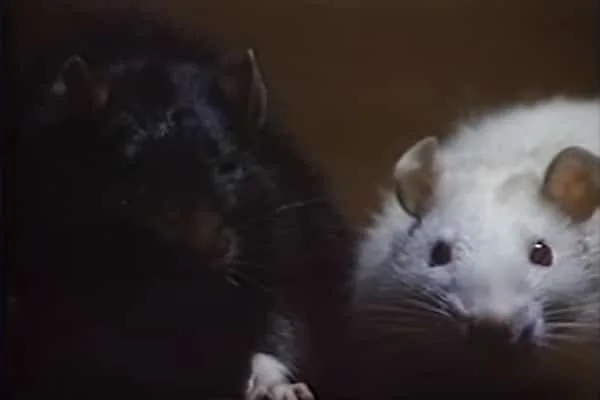
Willard himself is a rather feckless young man: he has a white-collar job as a cashier at the ultimate blue-collar business, a steel mill: he clearly doesn’t fit in there, and when he returns to the sprawling but tumble-down home which he shares with his mother (Elsa Lanchester), he’s frequently surrounded by elderly family members and family friends who can’t understand why he doesn’t use his initiative at work to get further on in life. The plant once belonged to his father, after all. After a particularly abortive 27th birthday party, Willard – miserable and brow-beaten – disappears outside. He sees a rat out there, but rather than call Rentokill, he throws the creature a few crumbs, which – being a rat – it happily eats. As escapism goes, it’s not orthodox, but Willard continues to feed the rats he sees, lying to his mother that he’s got rid of them. He even tries to obey her command to kill them off on one occasion, but he can’t face it: soon, Willard is spending more time with his growing cabal of rats, training them to perform simple commands.
To state the bleeding obvious, anyone with a rat phobia is going to have problems with Willard: the rat cast is actually quite large, though these are of course fancy rats (the tame variety) rather than wild rats. They’re quite well-trained, too, which makes the film’s initial premise seem more plausible than it might otherwise; I used to keep fancy rats myself, and I can verify that they’re surprisingly bright little critters who can learn basic commands, even if they then choose to do the opposite of what they’re meant to be doing at twice the speed. Course, I’ve never (yet) tried to train a rat to take vengeance on a malingering boss, as Willard eventually does: as his life begins to unravel, the command he exerts on his rat posse becomes more and more unlikely. The film is chiefly about a man losing control over his life, however: the rats are an engaging sideshow, but the spotlight is very much on Willard.
With these rather gentler kinds of exploitation films – y’know, where the goings-on are incredibly unlikely but there’s a story behind it – it’s completely possible to take them on face value. You can do that with Willard: sad loser wreaks havoc on an unfair world. It’s interesting, though, if you can be persuaded to look a little further, to see a young man up against a system which seems completely stacked against the young. The only people who own anything are resolutely much, much older: the Willard family business has gone to an opportunistic post-World War II businessman; Willard’s remaining family are ageing; he has no siblings; even the people meant to care for him or about him are ludicrously out of touch. The 1970s inhabited by our main character is a very lonely place – lonely enough for him to make friends with creatures usually considered vermin. He has no control over who comes and goes at his own home, either: let me potentially be the first person to compare Willard to mother! (2017) in that he continually finds people letting themselves in, talking about helping themselves to his house, and there’s even an impromptu funeral bash which he hasn’t organised.
Still, for all the extremes of unlikelihood which ensue, with rats eventually rebelling against their master, Willard is by and large a fairly quiet film, with only one or two scenes which go beyond this. Really speaking, Willard is an interesting oddity in the ‘careful what you wish for’ category, an engagingly dismal look at 70s America.
Clearly, it was modestly successful enough to give rise to a sequel: Ben (1972) appeared just the next year, this time named for the particularly intelligent rat rather than for yet another lonely human whom he would ‘work alongside’. Ben therefore shifts focus, escalating the horror which only constituted a fragment of the earlier film and adding extra rat attacks on humans. And yes, it’s a bloody weird quirk of history that the late Michael Jackson sang on the film’s soundtrack: perhaps people don’t realise that the King of Pop was in fact serenading a hyper-intelligent killer rat, but there we go.

Ben (1972) feels as rushed as it no doubt was, but it’s interesting in how it manages to generate some sympathy for a pack of occasionally hostile rats led by an oddly prescient rat. It retains the same half-eye on the underbelly of America, too, with lots of clambering about in the tunnels beneath the streets. The performance given by Danny (Lee Harcourt Montgomery) swings the focus, though, now that we have a victimised child in the frame, rather than an isolated adult. By the end, you even find yourself gunning for the child/rat combo rather than the people meant to be sorting things out, which happens despite all of the film’s flaws and overdependence on simply chucking more rats into the mix. Their friendship is even a little Disney, considering all that’s gone before – which includes the addition of flamethrowers.




